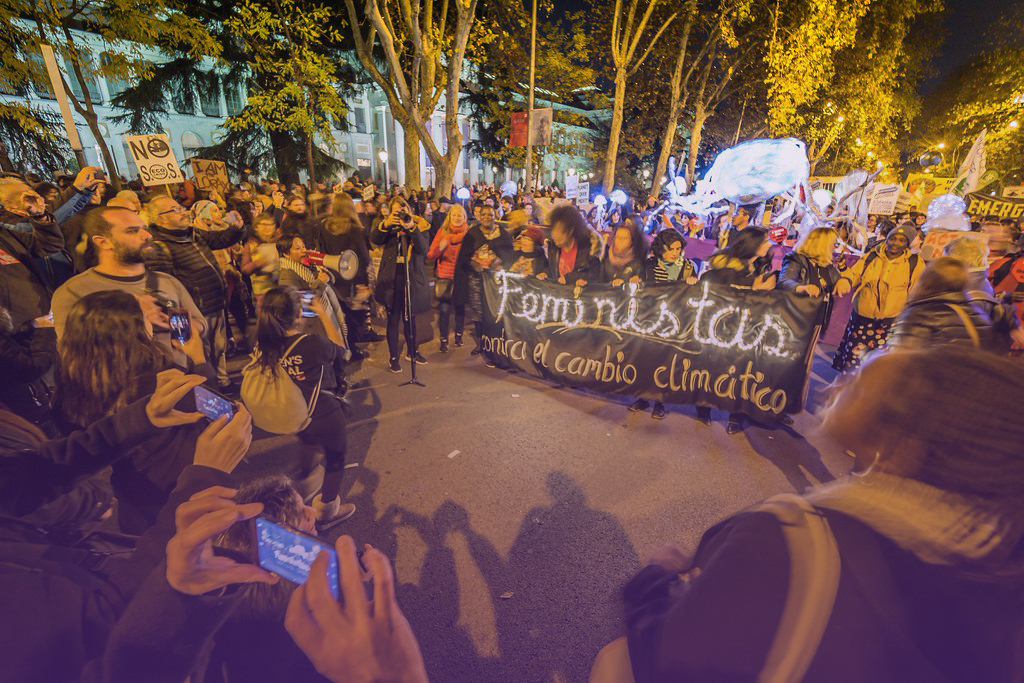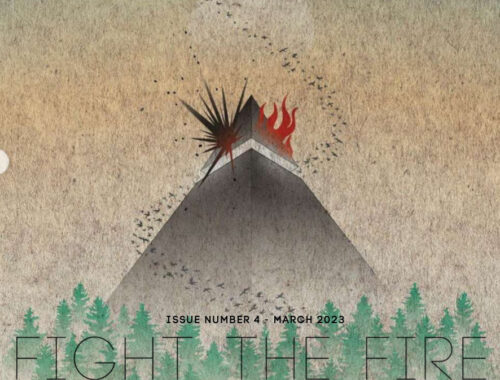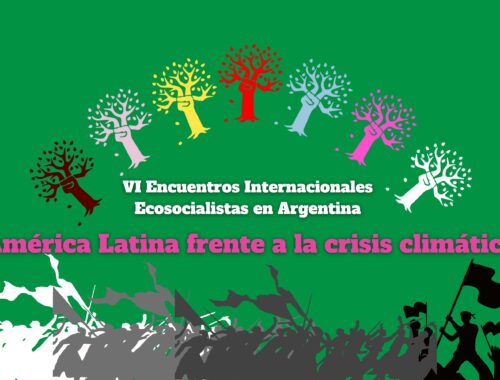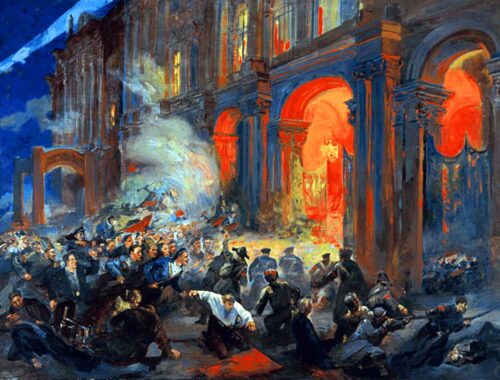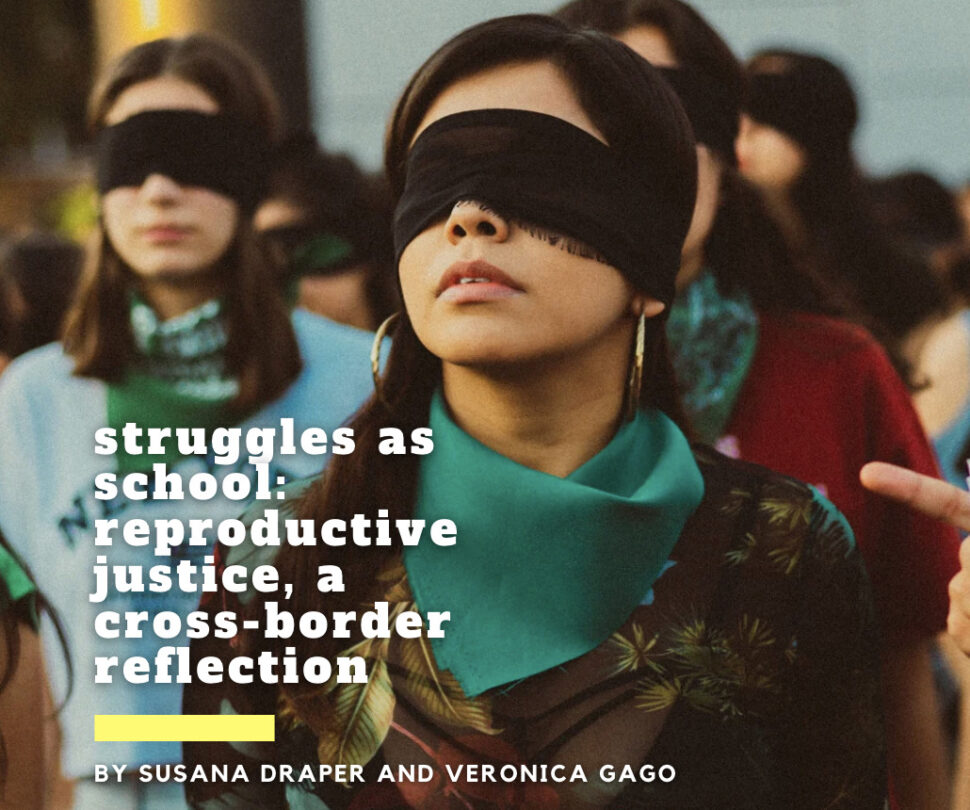
Struggles as school: reproductive justice, a cross-border reflection
By Susana Draper and Veronica Gago
Preamble by Julie Gorecki
An Ecofeminist System Change Not Climate Change
We need an ecofeminist system change not climate change. This means uprooting the major intersectionalist systems of racial, gender and class oppression, that together, compose capitalism.
Ecosocialism is founded in the understanding that global climate change is a symptom of the social, political and economic structure of global capitalism. A system founded in the historical labor exploitation of poor, working class and marginalized peoples. A system exported across borders through the brutality of colonialism and imperialism. A system that has unjustly divided the world into a Global North and a Global South.
Socialist Feminists have long shown how the deepest roots of this system are also inherently patriarchal and racial. How at its base, global capitalism was established in the gendered and racist subordination of women and the reproductive labor of their work and bodies.
These racial, gendered, and classed systems of oppressions are also interdependentlY entangled with extractivism— the operation of endlessly extracting finite natural resources to fuel the international neoliberal markets. Ecological feminists have explained how at the crux of these extractive industries sit Indigenous women, global southern women, women of color in the Global North, and trans and gender non-conforming people. These are the people who are hit the “first and worst” by climate change as the transnational movement of Women and Feminists for Climate Justice has told us. Yet, while carrying the heaviest burdens of climate catastrophe, they are also spearheading the most innovative solutions towards a climate just world. They are the vanguards of the global climate justice movement. “Not victims but targets” as movement activists have put it.
There are direct links between the subordination of gender and the natural environment by what can be described as The Racial Capitalist Climate Patriarchy.
In 2022, this system has put us at an apex of multiple global crises. Global warming, global poverty, the global refugee crisis, and the global health crisis of COVID-19 (yes, it’s still happening) are some examples of what we are up against.
From a feminist perspective, we have seen an escalation of attacks on reproductive rights and health worldwide, a cross-border crisis of femicide, and continuing worldwide subordination of all women’s (cis and trans) bodies and power.
In the last several years there have been flagrant crackdowns on women’s bodily autonomy through a draconian curtailing of reproductive rights transnationally. From the Polish constitutional court attempting to diminish already radically reduced abortion access in 2020, to the 2022 reversal of the almost 50 year old Roe vs. Wade ruling in the United States, the growing pattern of thrashing reproductive justice rights shows that, across the planet, women are under direct attack. And just like with climate change, racialized, poor and gender marginalized women are disproportionately impacted.
Yet, every global crisis is met with a fierce global resistance. From the “Strajk Kobiet” in Poland to the groundbreaking “Green Wave” or “Green Tide” abortion rights movement across Latin America, the galvanization of the “Women’s Strike” has sparked an ambience of international feminist revolution. And there have been massive wins. In 2020, Green Tide activists celebrated the legalization of abortion in Argentina, while it was decriminalized in Mexico in 2021 and in Colombia in 2022. This Latin American movement has become emblematic of the feminist uprising and victories towards reproductive rights for all.
In this edition of Fight the Fire we are thrilled to republish the words of two central activists, thinkers and comrades on a cross-border dialogue between the Latin American reproductive justice movement and the fight for abortion rights in the United States at this crucial moment.
Originally published on Verso blog here is Susana Draper and Verónica Gago’s essential Struggles as school: reproductive justice, a cross border reflection. Vital voices and reading towards the preliminary groundwork needed towards the ecofeminist system change not climate change we aspire to.
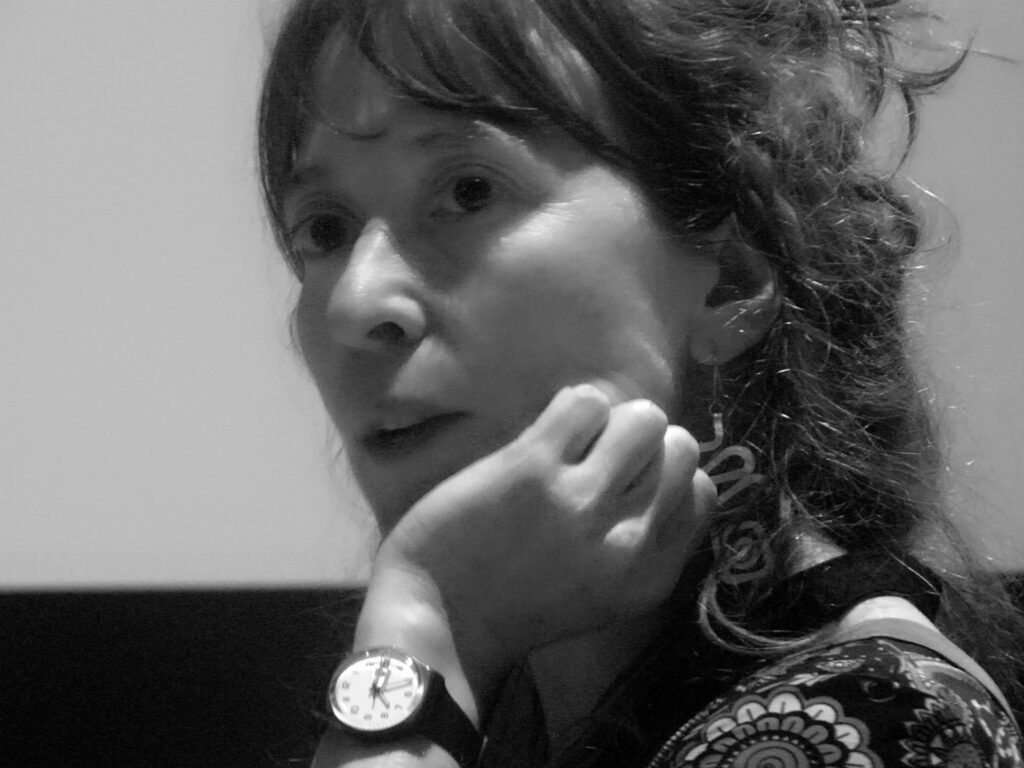
Susana Draper lives in New York and has been part of the Feminist research on violence, Laboratoria. Espacio de investigación feminista, Ni Muertas Ni Presas, and Critical Resistance’s The Abolitionist editorial collective. She teaches at Princeton and is author of 1968 Mexico and Afterlives of Confinement.

Verónica Gago is a member of Argentina’s #NiUnaMenos movement (Not One More!), as both a theoretician and an activist. She is also a Professor of Social Sciences at the University of Buenos Aires, Professor at the Instituto de Altos Estudios, Universidad Nacional de San Martín, and Assistant Researcher at the National Scientific and Technical Research Council (CONICET).
STRUGGLES AS SCHOOL: REPRODUCTIVE JUSTICE,
A CROSS-BORDER REFLECTION
“Legal abortion around the world!” That was the chant heard a few days ago outside the U.S. Embassy in Buenos Aires. The iconic green handkerchiefs, the symbol of support for reproductive rights, flooded the streets as green flares were lit and hand-written signs – “Abort capitalism! Abort the court!”– circulated throughout the Argentine capital, one of the beacons in today’s global struggle for abortion rights.
The U.S. Supreme Court’s decision to criminalize abortion – the same week that it upheld the right to bear arms in public – launched a cross-border dialogue over how the feminist movements of Latin American, riding high on a wave of victories, can come to the aid of other struggles amid a global onslaught of patriarchal, conservative and neoliberal reaction.
Back in the United States, the recent July 4 festivities were disrupted by protests against the criminalization of abortion. #BlackLivesMatter protests also spoiled the Independence Day celebrations in Akron, Ohio, after news about the murder of Jayland Walker was made public: a 25-year-old Black man who on June 27th last year ran a red light and was shot sixty times by eight police officers who “thought” he was carrying a gun. Later that day, following the Highland Park shooting that left six people dead and around twenty-four wounded, criticism of the Court’s decision to uphold the right to carry firearms was back front and center in the national media.
Feminist demonstrators in the United States made clear that this July 4th, they were not in a celebratory mood: “The 4th of July has been cancelled due to the lack of Independence. Best, women,” read one sign. Another called on demonstrators to drown out the red, white and blue of the flag with green, the symbolic color of the international campaign for abortion rights. Everywhere, the emphasis was on street mobilizations: #TakeTheStreet #StayInTheStreet.
Among the slogans making the rounds in recent marches, the call of black feminists’ that there is to be “No reproductive justice without an end to police violence” best captures the mood, one that cuts across national borders. Just as incidents of gun violence followed on the heels of the Supreme Court’s decisions, it has become clear that legislation has immediate repercussions in the streets.
Notable in recent U.S. demonstrations is the visible legacy of Latin America’s feminist movements. Increasingly ubiquitous in the U.S. has been the green scarves, a symbol born on the streets of Latin America, representing a desire to build coordinated actions and organizational strength at an international level.
All of which begs the question: how can a cross-border feminist movement help us to sharpen our collective analysis? and how can it help us, feminists in the U.S. and globally, to build strategies to reverse the Supreme Court’s decision? How do we confront this global association – patriarchal, if ever it was – between the further deregulation of firearms, violence and the criminalization of abortion, when they point directly to the persecution of women and racialized people? And what are the ricochet effects of this advancement of the U.S. rightwing agenda in other regions?
Just a few weeks ago in Brazil, the website “Portal Catarinas” reported that a judge in the state of Santa Catarina not only tried to convince an 11-year-old rape victim to not have an abortion, she went as far as to forcibly place her in a “shelter” for minors in order to prevent her from receiving one. Public indignation rapidly spread, soon going viral and, despite President Bolsonaro calling the procedure “inadmissible”, the girl did eventually receive an abortion in accordance with Brazilian law.
Yet, the episode was later invoked by rightwing figures in public administrative hearings, where women were branded as “liars and murderers” who “gave birth while dancing baile funk”. Since the incident in late June, anti-abortion propaganda has only grown stronger in Brazil – no doubt encouraged by the events in the U.S.
The global scale of this rightwing counter-offensive is a challenge to deepen the internationalist dimensions of our organizing efforts. But what type of internationalism? Victories for abortion rights in Colombia, Argentina, Mexico, and, most recently, in Chile’s constitutional reform project, are more than just the achievement of women to exercise rights over their own bodies: they are a binding force, bringing together struggles in sometimes far-flung parts of the world.
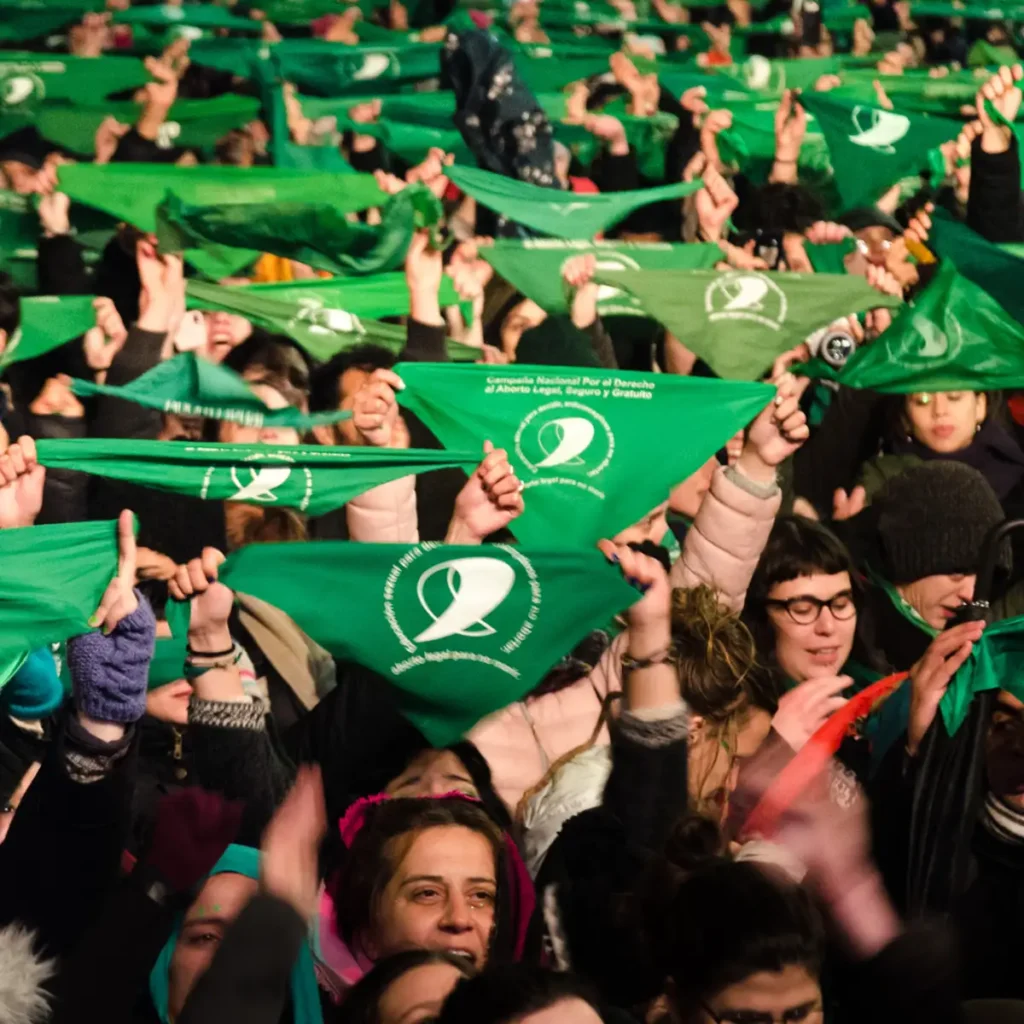
Particularly where the feminist movement is concerned, recent years have seen something of an “epistemic inversion”: from southern geographies, there have emerged new kinds of organizational knowledge best displayed in the wave of victories for reproductive rights and in the growing mass appeal of feminism.
Much of which has been in evidence in the international women’s strikes, which began in Argentina but have since spread across the world. These mobilizations have included a diverse group of bodies, including trade unions, popular leaders, social movements, migrant collectives, and more. Many more feminist struggles have also taken shape amid Latin America’s recent wave of social uprisings (not least in Chile, Colombia and Ecuador).
And Latin America’s feminist movement is just as noteworthy for its versatility as it is its combativeness. From the street to the legislature, from trade unions to the electoral arena, even the judiciary, feminism is disputing power in every corner of society and government. It is in such an expansive capacity of the feminist movement that we must look for explanations as to why a full-on assault on both rights and public resources has begun with women’s reproductive rights.
As Silvia Federici has said, about the current situation in the United States: “The war against women is at the nerve center of our current neoliberal moment. Whoever controls the process of reproduction, controls the forms of exploitation”. In this context, her groundbreaking research on early modern witch hunts has gained a new salience. What once seemed like permanent progressive victories are being overturned across the globe. And in each, new technology, like fertility, ovulation and menstrual cycle apps, is being utilized to enact a culture of coercion, control and suspicion. Texas’s anti-abortion legislation exposed a system of surveillance where it is not only abortion seekers that are persecuted but also a whole network of “accomplices”.
Faced with growing precarity, popular feminism both in the Global South, and more broadly, has put social reproduction at the center of the political agenda. When we speak of “reproductive justice” rather than “reproductive rights”, we are shifting the way we think about reproduction itself, connecting it with work (paid and unpaid), with migration, with precarity and myriad other forms of systemic violence. As Loretta Ross, one of the historical founders of SisterSong, explains, speaking of reproductive justice opens a new framework of analysis in which the right to autonomy includes not only the right to have or not to have children, but also to be able to be a mother within sustainable and healthy communities.
Speaking of the struggle for abortion rights as reproductive framing allows us to move away from the liberal framing of abortion as an individual “choice” and an isolated right with no relation to other rights struggles. This has long been the position of different currents of black feminism, where the understanding of “reproduction” has long tended to be broader and more interconnected than the liberal understanding of individual rights.
Even in our current political climate, as the conservative right takes aim at the bodies of women, lesbians, trans and non-binary people, we believe that there are growing connections across far-flung territories. And these connections point to a growing internationalism present in everyday struggles. It is our hope that, by filling the streets of the world with green, and expressing a common feminist struggle, we can rise above our particular locales and sustain our movements in a web of international solidarity.
The white scarf of Argentina’s Mothers of Plaza de Mayo was itself a worldwide symbol of the struggle against state terrorism under a military-civilian-business-clerical dictatorship (1976-1983), a system in which the role of the CIA was fundamental. This simple garment, originally made from a cloth diaper, turned them into a global icon of resistance – not unlike the green handkerchief today.
As feminism has grown to become a mass movement, the Mothers and Grandmothers of the Plaza de Mayo have become a key source of inspiration. Through them, the feminist movement traces a genealogy of affiliations, affect and radicalism, and a tenacity to demand memory, truth and justice. In 2018, Argentina’s National Campaign for the Right to Abortion saw the green handkerchief achieve a similar symbolic power.
Increasingly in Argentina, the connection between the two colors has taken on its own meaning, as the green handkerchief signifies not only the right to abortion but the idea that “motherhood will be desired or it will not be”.
In the United States, the linking of white and green handkerchiefs is possible wherever mothers have mobilized against the murder of their children by police violence. Connecting reproductive justice with the struggle against police brutality shows how such violence, as Monica Raye Simpson says, “destroys entire families and steals the children of Black families.”
Simultaneous demonstrations against the criminalization of abortion and against Walker’s murder by Akron police made this connection explicit. Within the framework of the reproductive justice struggle, it becomes all too clear that surveillance, criminalization and precarization of the lives of poor and racialized women is a direct attack on mothers and women in their ability to pursue a dignified life within healthy communities.
By linking the struggle abortion rights with other collective struggles, not least with over class, as has happened in Latin America, it becomes clear that economics severely constrains the possibility of motherhood for the most impoverished women.
“Feticide” laws prosecuted in U.S. conservative states amount to a systematic siege on the lives of thousands of women who, by simply miscarrying, could be sentenced to decades in prison. The pamphlet “The Criminalization of Pregnancy: A War on Reproduction” by Feminist Research on Violence, details an intensified legal campaign focused on the control and criminalization of the lives of millions of racialized women impoverished by neoliberalism.
It is no coincidence that, among the protest actions scheduled for July 4, activists staged a demonstration outside immigration offices in New York, saying, “Reproductive Justice means Immigrant Rights.” Speaking of reproductive justice and immigrant rights again puts the question of reproduction front and center: what kind of material conditions of reproduction make possible a system based not he dispossession of territories and the denial of housing, food, shelter, medical care, etc.? How does the criminalization of abortion relate to the long history of forced sterilization of Black women and women of color in jails?
These connections need to be reinforced through the political practice of alliance building. Often, however, they are shunned by an NGO activism that focuses on fundraising galas, losing the link to the grassroots.
As Judith Butler has recently written, “If the right-wing brings us together as a target more effectively then we ourselves are brought together as a movement, then we are lost”. We could also put it this way: if the patriarchal, conservative and neoliberal counter-offensive lumps us into one common “enemy” and “threat”, we can claim that mantle as a subversion of a exploitative, racist and patriarchal order.
The movements of Latin American have shown that we have a capacity to articulate among diverse groups and sustain different levels of action simultaneously, all while recognizing that mobilization in the street and the grassroots work of organising are key to altering the balance of forces. Now is the time for a movement to take shape through concrete and transversal alliances.
